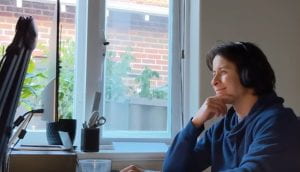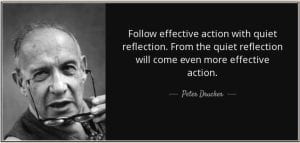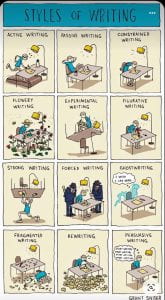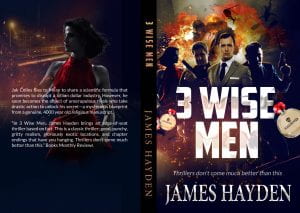 The Power of Words to Resurrect Your Story
The Power of Words to Resurrect Your Story
The legacy of our earliest ancestors left them with two options when confronted with fear – to stay and fight or to run as fast as they could. Those who were good at predicting the outcomes survived and passed this genetic trait down to us.
Faced with this situation – real or imaginary – the brain mobilizes the body’s resources. It sends a rush of adrenaline and other hormones coursing through the body. Our pupils dilate to see better. Our heart pounds and our breath quickens to rush blood and oxygen to our muscles. We might turn pale as blood is directed away from the skin to power the muscles and fuel the brain. We might tremble or shake as our muscles tense, primed to take action. You might even get goosebumps, as tiny muscles flex in the skin, causing hairs to stand up. All triggered by the brain’s prime directive: survival.
When we realize that the danger isn’t real, we are left with a dopamine rush – the “feel good” hormone released in the process. While I adore a good scare, not everyone enjoys the thrills of a haunted house, a wild roller coaster ride, or a spooky story. Neuroscientists believe that may be because our brains have different sensitivities to the dopamine rush.
At an anniversary screening of Halloween many years ago, one of our young interns, now a successful manager and producer, sat beside me. She squirmed throughout, grabbing my arm and practically crawling into my seat in the scariest scenes. “Jamie Lee Curtis is alive and well and sitting two rows ahead of us,” I hissed. It didn’t matter. For her, the dopamine rush was too intense.
Strong storytelling engages us, draws us in, pulls us into the world, and straps us into the shoes of the character. We feel what they feel. Instead of merely observing, we are participating. We are in the moment. Caught up in the spell you’ve woven with your words.
Delicious dopamine cannot be activated with the overly familiar. Our brains have come to ignore phrases that once made storytelling awesome, but have been overused:
Upset the applecart.
Clichés fail to activate our brains. Switching them up with something inventive yet understandable grabs our attention. It delivers more emotional impact and will resonate with your reader.
Shaken like a snow globe.
To keep that dopamine flowing, the words and the elements of your story must be fresh and distinctive.
Read the full article from scriptmag.com
 “It’s so simple to let rejections take their toll, but we have to keep dusting ourselves off. After all, if you keep your work to yourself, your chance of anyone liking it is nil, whereas submitting could lead to something great. I’ll take slim odds over none any day of the week. And if you are professional and send your materials to enough people, hopefully you’ll be lucky enough to find the person who loves your work as much as you do!”
“It’s so simple to let rejections take their toll, but we have to keep dusting ourselves off. After all, if you keep your work to yourself, your chance of anyone liking it is nil, whereas submitting could lead to something great. I’ll take slim odds over none any day of the week. And if you are professional and send your materials to enough people, hopefully you’ll be lucky enough to find the person who loves your work as much as you do!”
 Waiting is a difficult game and not many of us are built to handle it well. “Waiting for what?” you might ask. It could be waiting for your next plot idea, next book concept, or waiting for a literary agent to get back to you after a full manuscript request. So, to ease the pain, here are a few suggestions:
Waiting is a difficult game and not many of us are built to handle it well. “Waiting for what?” you might ask. It could be waiting for your next plot idea, next book concept, or waiting for a literary agent to get back to you after a full manuscript request. So, to ease the pain, here are a few suggestions: The Power of Words to Resurrect Your Story
The Power of Words to Resurrect Your Story Alaa Al-Barkawi says, “Growing up Iraqi Muslim American post 9/11 and during the US occupation of Iraq, I was constantly flooded with images of my people as the villains, and it affected my work as a writer…Through many trials, plot changes, and mental breakdowns…not only did I have a newer, shinier draft—but a new story I didn’t know existed in this book!”
Alaa Al-Barkawi says, “Growing up Iraqi Muslim American post 9/11 and during the US occupation of Iraq, I was constantly flooded with images of my people as the villains, and it affected my work as a writer…Through many trials, plot changes, and mental breakdowns…not only did I have a newer, shinier draft—but a new story I didn’t know existed in this book!”
 A writer (
A writer (

